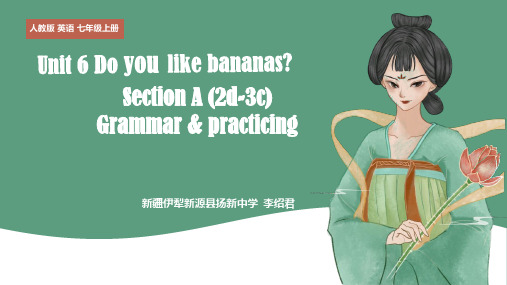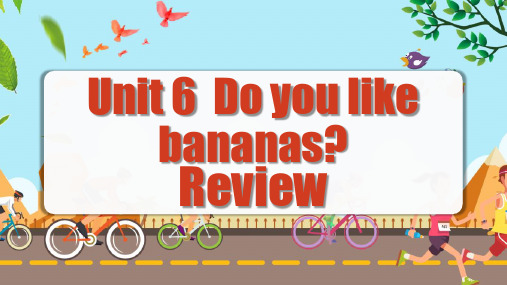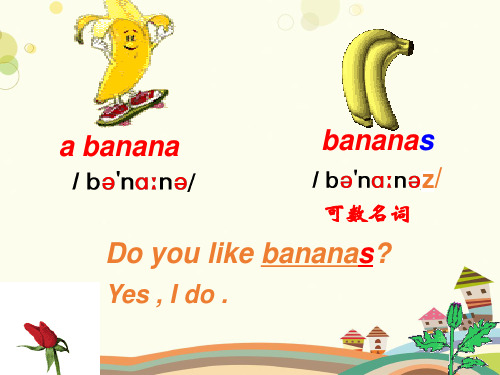七年级英语上册Unit6Doyoulikebananas(第3课时)课件(新版)人教新目标版
- 格式:pdf
- 大小:2.47 MB
- 文档页数:26

七年级英语上册unit6课件新人教版七年级英语上册unit6课件英语的教学一直是一个比较大的难题,要如何进行新人教版七年级英语上册unit6的教学呢?以下是小编整理的新人教版七年级英语上册unit6课件,欢迎阅读。
教学内容:Unit 6 Do you like bananas?教材解读本单元主要讨论各种食物以及喜欢或不喜欢某种食物;询问某人是否喜欢某种食物及回答;会描述一日三餐,会合理搭配一日三餐。
like的一般现在时、一般疑问句及肯、否定回答;肯定句和否定句。
通过本单元的学习,认识到在平日饮食中要做到不挑食、不偏食、合理饮食。
教学目标一、知识与技能1. 掌握基本词汇:food、banana、hamburger、tomato、broccoli、French fries、strawberry、orange、ice cream、salad。
2. 掌握句型:Do you like bananas? Yes, I do./No, I don’t.二、过程与方法通过听说读写等任务型活动,熟练应用所学单词和动词词组。
三、情感态度和价值观认识并了解各种食物,能分清水果和蔬菜并能认识到水果和蔬菜对人体有益。
通过询问对方是否喜欢某食物来引起话题。
教学重点基本单词、词汇和句型。
教学难点1. 认识并掌握重点词汇。
2. 能流利地与对方开展关于食物喜好的'对话。
教法导航采用任务型教学途径并配以多媒体辅助教学,同时考虑学生的不同层次采取分层递进的教学方法。
学法导航让学生在游戏的情景中感受到轻松愉悦、民主和谐的环境气氛,学生积极主动参与,从而产生了强烈的求知愿望,增强学习兴趣。
教学准备PPT、关于食物的图片。
教学过程Step 1: Greetings. Greet the students as usual.Step 2: Revision Show the students pictures and ask:What’s this? It’s a soccer ball. Do you have a soccer ball? Yes, I do./No, I don’t. Do you like it? Yes, I do./No, I don’t.Step 3: New words Show the students some food and ask: 2 What’s this? It’s a hamburger. Do you like it? Yes, I do./No, I don’t.What are these? They’re bananas. Do you like bananas? Yes, I do./No, I don’t.运用图片和对话教学单词:hamburger、banana、tomato、broccoli、French fries、strawberry、orange、ice cream、salad,并运用这些单词进行对话。

Unit 6 Do you like bananas?Part 1 Words and Expressionsbanana /bə'nɑːnə/ n. 香蕉hamburger /'hæmbɜː(r)gə(r)/ n. 汉堡包tomato /tə'mɑːtəʊ/ /tə'meɪtəʊ/n. 西红柿ice-cream /,aɪs'kri:m/ n. 冰激凌salad /'sæləd/ n. 沙拉strawberry /'strɔːbəri/ n. 草莓pear/peə(r)/ n. 梨milk /mɪlk/ n. 牛奶bread /bred/ n. 面包birthday /'bɜː(r)θdeɪ/ n. 生日dinner /'dɪnə(r)/ n.(中午或晚上吃的)正餐week /wiːk/ n. 周;星期think about 思考;思索food /fuːd/ n. 食物sure /ʃʊə(r)/ adv. 当然;肯定;一定How about…?(提出建议)……怎么样?burger /'bɜː(r)gə(r)/ n. (= hamburger) 汉堡包vegetable /'vedʒtəbl/ n. 蔬菜fruit /fruːt/ n. 水果right /raɪt/ adj. 正确的;适当的apple /'æpl/n. 苹果then /ðen/adv. 那么egg /eg/ n. 蛋;鸡蛋carrot /'kærət/ n. 胡萝卜rice /raɪs/ n. 大米;米饭chicken /'tʃɪkɪn/ n. 鸡肉so /səʊ/ conj.(引出评论或问题)那么breakfast /'brekfəst/ n. 早餐;早饭lunch /lʌntʃ/ n. 午餐star /stɑː(r)/ n. 明星;星星eat /iːt/ v. 吃well /wel/ adv. 好;令人满意地habit /'hæbɪt/ n. 习惯1healthy /'helθi/adj. 健康的really /'riːəli/ adv. 真正地question /'kwestʃən/ n. 问题want /wɒnt/ v. 需要;想要be /biː/ v. 变成fat /fæt/adj. 肥的;肥胖的Part 2:Texts课文(一)Jack: Hey, John’s birthday dinner is next week. Let’s think about the food.Tom: Sure. How about burgers, vegetable salad, and some fruit? Bill: Sounds good. John likes hamburgers.Jack: Oh, I don’t like salad.Bill: But John likes salad, and it’s his birthday.Jack: Yes, you’re right. What about the fruit?Tom: I think John likes strawberries and apples.Jack: OK. Let’s have strawberries and applesthen.Structure——谈论好恶1.Do you like salad? Yes, I do./No, I don’t.2.Do they like pears? Yes, they do./ No, they don’t.3.Does she like tomatoes? Yes, she does./ No, she doesn’t.4.I like oranges. I don’t like bananas.5.We like rice. We don’t like hamburgers.6.He likes ice-cream. He doesn’t like vegetables.重点句型:—Do / Does sb. like…?—Yes, sb. do / does.—No, sb. don’t / doesn’t.sb. like/likes ….sb. don’t/doesn’t like ….Underline the correct words in the brackets.在括号内正确的单词下画线。










Unit 6 Do you like bananas一、阅读理解。
A【题文】Mum gives little Tom ten yuan. Then little Tom goes shopping. He gets on the bus and sits down next to an old woman. Then he sees the old woman’s bag is open. There is ten yuan in it. He quickly looks into his pocket. The money isn’t there now! Little Tom is sure that the old woman is a thief(小偷). He decides(决定)to take back the money from the old woman’s bag. So he carefully puts his hand into the old woman’s bag,takes the money and says nothing. Suddenly (突然地)the old woman shouts,“Where is my money? I can’t find it. There is a thief in the bus.” Little Tom feels str ange(奇怪的). Then he sees his own ten yuan under his seat. Little Tom is thinking a question now,“Am I a thief ?”1. 【小题1】 is sitting beside little Tom.A. A young womanB. An old womanC.A young manD. An old man2. 【小题2】 Little Tom sees in the old woman’s bag.A. a walletB. a packetC. ten yuanD. ten dollars3. 【小题3】 Litt le Tom is sure that the old woman is a .A. thiefB. teacherC. rich womanD. poor woman4. 【小题4】 Little Tom sees ten yuan under his seat.A. his ownB. the old woman’ sC. the thief’ sD.the driver’ s5. 【小题5】Which of the following is right?A. Little Tom is a bad boy.B. Little Tom often steals(偷)things.C. Mum gives little Tom twenty yuan.D. Little Tom makes a mistake(错误).【答案】1.【小题1】B2.【小题2】C3.【小题3】A4.【小题4】A5.【小题5】D【解析】试题分析:这篇短文讲述的是Tom在公交车上看到挨着他的老太太包里有10元钱,而他自己的 10元钱恰好不见了,他就以为是那个老太太偷了他的。

初一英语Unit 6 Do you like bananas? 人教版(新目标)【本讲教育信息】一. 教学内容:Unit 6 Do you like bananas?(一)语言目标谈论爱好和厌恶。
(二)语言功能学会用英语表达自己喜欢或不喜欢的东西,询问别人是否喜欢,提出建议。
(三)重点句型Do you like bananas? Yes, I do./No, I don’t.I like French fries. I don’t like tomato es.(四)主题词表(五)重点词汇及短语词汇:like, hamburgers, tomatoes, broccoli, French fries, oranges, ice cream, salad, bananas, eggs, carrots, strawberry, apples, chicken, breakfast, lunch, dinner, fruit, vegetable.短语:a lot of like to do sth. like doing sth.(六)语法1. 动词like的用法。
2. 一般疑问句的肯定、否定回答。
3. 名词复数的使用。
(七)重难点分析:1. 可数名词和不可数名词(1)可数名词:①定义:是可以计数的名词。
②可数名词前可以用a,an限定。
③可数名词前可以用one,two,three…限定。
④可数名词有复数形式。
(2)不可数名词:①定义:指不能计数的名词。
②不可数名词前不可以用a,an限定。
③不可数名词前不可以用one,two,three…限定。
④不可数名词没有复数形式。
2. 一般名词的复数形式(1)一般在名词词尾加-s。
如:banana-bananas(2)以-o,-s,-sh,-ch及-x结尾的名词,在词尾加-es构成复数形式。
如:tomato-tomatoes (3)有些以-o结尾的名词仍加-s。



